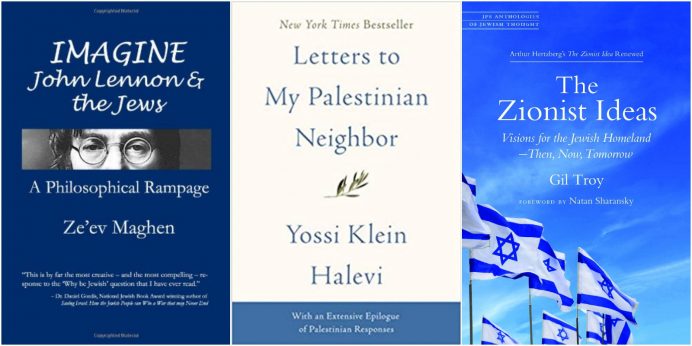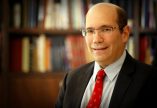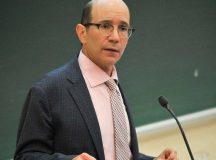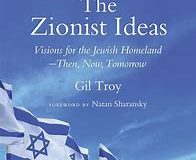Fathom is inviting experts to select their three favourite books about a subject. The series began with Sara Hirschhorn on settlements. Here, Gil Troy discusses three books on Zionism.
There are many academic books on the history of Zionism, the various schools of Zionist thought, particular Zionist thinkers, the accomplishments of Zionism, the sins of Zionism, and how to defend Zionism. But the most important books about Zionism help us take Zionism personally, understanding it as a movement, an ideology, a value system – in short as a foundation of modern Jewish identity.
A book on Zionism works if it helps the reader understand what the Jewish problem was and is – and how Jewish nationalism solves that problem, collectively and individually, today rather than just yesterday.
Unfortunately, these days, before appreciating Jewish nationalism, one has to cut through all the propagandising against nationalism in general. The ‘woke’ crowd that denounces nationalism somehow supports Palestinian nationalism, Black nationalism, etc. but making that point doesn’t help. Many young Jews in particular continue to worship in the secular church of universalism, believing that we all should try evolving into a world without borders, boundaries, solidarities, and particularities.
Ze’ev Maghen, Imagine: John Lennon & the Jews: A Philosophical Rampage (Toby Press: 2015)
That delusion is why the first Zionist book I recommend is Ze’ev Maghen’s, Imagine: John Lennon & the Jews. This creative, cascading, self-proclaimed ‘philosophical rampage’ unapologetically embraces nationalism in general – and Jewish nationalism in particular. Maghen tackles ‘the puzzle of the hour,’ characteristically writing in bold: ‘Why on earth be a Jew in the (post) Modern world?’
Maghen detests John Lennon’s Imagine as an anthem of anomie and alienation. Maghen doesn’t want to live in a world without countries or loyalties or tribes or boundaries – that makes you just live for ‘today-ayyyy.’ He demonstrates why humans need tribes, commitments, communities, and stories. These frameworks help us define ourselves, connect with one another, and build a better world together – which ultimately is what Judaism and Zionism seek.
Universalists often love humanity abstractly, in theory not in practice. Particularists, nationalists, loyalists, learn to love their allies in real life. Defining nationalism only by its extremes is like seeing a monsoon in every raindrop. We need the regular, normal, temperate rain showers – even while bracing for occasional deadly storms.
In a classic Maghen riff, he describes proposing to a young lady in a Lennonist – not a Leninist – style: starting with ‘I love you’ but too-quickly escalating into ‘I love you as much as I love everyone else in the room, nay in the world.’ She then walks out in a huff, feeling unloved. If you universalise love – you lose it.
Maghen uses Zionism as his model to demonstrate particularism’s grounding power. Refuting worries that belonging negates autonomy, he says his self-confidence frees him to embrace ‘the incredible privilege of being an integral participant in that unparalleled, nearly impossible phenomenon…called the Jewish people.’
And he imagines the Ministry of Defense tower in Tel Aviv broadcasting the essential Zionist message: ‘No one will ever hurt you again. No one will starve you, or beat you, or gas you, no one will rip up your mothers with child…You are safe and you are blessed… You are home.’
You may not agree with everything. But after reading Maghen’s work, you will never think of Zionism as just a set of pro-Israel talking points ever again.
Yossi Klein Halevi, Letters to my Palestinian Neighbor (Harper Perennial: 2019)
Yossi Klein Halevi’s book is more sober, straightforward, and substantive than Maghen’s work, but it too is a love letter to the Jewish people in all our complexity, richness, and craziness. It’s a love poem defining Zionism ‘as the Jewish attachment to the land of Israel and the dream of renewing Jewish sovereignty in our place of origin,’ because ‘Judaism isn’t only a set of rituals and rules but a vision linked to a place.’ And it’s a patriot’s embrace of Israel, which he loves unconditionally, treating Israel’s flaws as ‘challenges not deterrents,’ and addressing them loyally, with a clear sense of responsibility – that lovely Zionist value – as ‘my flaws, distortions in my own Jewish being that I need to confront.’
The book is structured as a series of letters to Palestinians. Nevertheless, it’s essentially explaining to the young generation of Jews what Judaism, the Jewish people, Israel and Zionism are all about. A direct approach to this audience wouldn’t work. But many have been happy to listen in to the authors charming, thoughtful, historically-rich and deliciously-eloquent explanations to Palestinians of who we are, who we were – and who we want to be.
Brave enough to confront messes, wise enough to think two thoughts simultaneously, Yossi Klein Halevi sees ‘Israel as a testing ground for managing some of the world’s most acute dilemmas – the clash between religion and modernity, East and West, ethnicity and democracy, security and morality. These are worthy challenges for an ancient people that wandered the world and absorbed its diversity.’ And that’s a compelling Zionist idea. (To read a Fathom interview with Yossi Klein Halevi about the book, click here).
Gil Troy, The Zionist Ideas, Visions for the Jewish Homeland―Then, Now, Tomorrow (JPS Anthologies of Jewish Thought: 2018)
And speaking of Zionist Ideas, I am in the awkward position of recommending my book The Zionist Ideas. Traditionally, I recommended Arthur Hertzberg’s 1959 classic, The Zionist Idea. That extraordinary anthology introduced generations to the thinker-heroes who redeemed the Jewish people with that great twentieth-century makeover, Israel. The opportunity to read excerpts written by Theodor Herzl, Ahad Ha’am, Rav Kook, Ze’ev Jabotinsky was enhanced by Hertzberg’s thoughtful, comprehensive, introduction.
But in 2018, I was given the privilege of updating this book, which was considered our Zionist Bible. I like to think that three moves I made introduce the next generation to a new, welcoming, Zionist discourse:
- First, by adding an ‘s,’ renaming the new edition The Zionist Ideas, I opened the conversation from right to left, religious to non-religious, Israel to the world. I added women, Mizrahim, Ethiopians, gays. Hertzberg had 34 thinkers, I included 168 – launching a wider conversation about who we are as a people, and how that contributes to the world.
- Second, I organised the Zionist thinkers into three historic periods: Pioneers: Founding the Jewish State – until 1948; Builders: Actualising – and modernising – the Zionist blueprints – from 1948 until 1998; and today’s ‘Torch Bearers’. Heirs to an amazing heritage, we, like runners in the Olympic relay, take responsibility for what has been passed from the past to keep it going, growing, glowing.
- Finally, within each period, I identified Six Schools of Zionist Thought: Political, Labour, Religious, Revisionist, Cultural and Diaspora. These Zionisms reflect the multi-dimensional identity journey not the advocate’s all-or-nothing approach. Diaspora Zionism moves from a Zionism of writing cheques to a Zionism of making meaning, Identity Zionism. Both Israelis and Diaspora Jews need to learn how to use Jewish nationalism, Jewish peoplehood, and the Jewish state as useful tools for finding purpose in our lives, for connecting to something greater than ourselves.
Today, most Jews seek inspiration, not salvation, from Israel – in these books, and beyond. (To read an interview with Gil Troy about the book, click here)
And honourable mentions to…
Daniel Gordis, Israel: A Concise History of a Nation Reborn. Helps understand Zionism’s great creation, the state of Israel.
Anita Shapira, Israel: A History. A more academic and thus less user-friendly than Gordis’s history, yet equally useful in providing context.
Theodor Herzl, Altneuland. Good to go back to the original vision of the founder of the movement (although not the idea!)
Natan Sharansky, Fear No Evil. Important to understanding Zionism from a personal perspective.





































